

Project «Voices of Jewish settlements. Minsk region.»פיתוח קשרי התרבות בין העמים של ישראל ובלרוס
|
|---|
Website search |
|
MainNew publicationsContactsSite mapVitebsk regionMogilev regionMinsk regionArkady Shulman
|
Arkady ShulmanTHE LAST JEW OF THE NALIBOKI PUSHCHA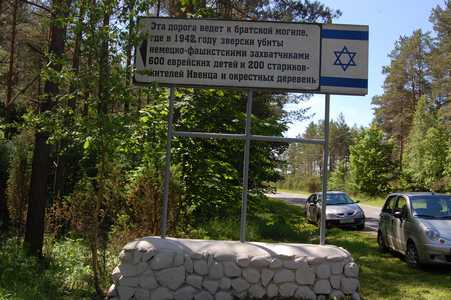 The road to the mass grave.
The road to the mass grave.
The shtetls in the Naliboki pushcha (Naliboki forest) were homes for many Jewish families. They lived in Ivenets, Naliboki, Kamen, Volma, Rubezhevichi, Derevno and other villages. They plied their trades, including pottery which made Ivenets famous, were carriage drivers, vendors, rented gardens, forests, lakes. They were bringing up children and dreaming of their happy future. They buried old people who died and cherished the memory of them. 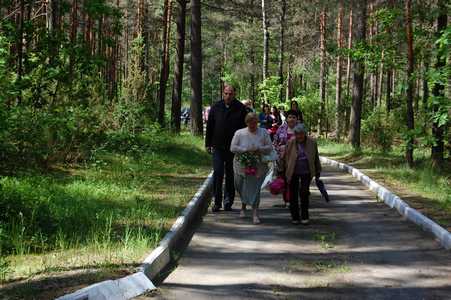 Remembrance Day.
Remembrance Day.
The history of the Jews of Naliboki counts several centuries. During the Great Patriotic War the Jewish partisan detachments of Sholom Zorin and the brothers Belsky were based in the Naliboki pushcha. In June 1942, the Nazis and their accomplices killed the ghetto prisoners in Ivenets. On the day of the 70th anniversary of the Ivenets ghetto extermination, where not only locals, but also Jews from the nearby shtetls and villages were herded in, the local authorities, war veterans, schoolchildren came to the monument. There were two local Jews among those who came to honor the memory of the killed. The two elderly men who remembered a different Ivenets are the Jewish community of today. 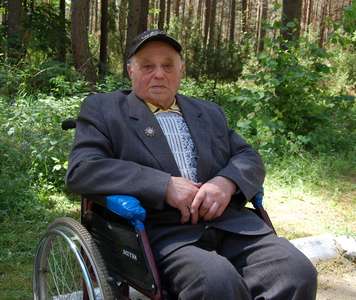 Iosif Kantorovich.
Iosif Kantorovich.
Iosif Kantorovich was brought to the monument in a wheelchair. – Will you talk to me? – Of course, he replied with a noticeable Jewish accent. – I'm from here, from Volma. I was born here in 1925. I remember well the pre-war period. There, – he pointed at the fenced plot around the monument, - my relatives are buried. – Tell me about your family. We lived under Poland until 1939. Our shtetl was located almost on the very borderline, while our house was just two hundred meters away from the border. We got along well with the Polish people. There was a synagogue, we went to pray. I attended heder. But in the evening we had to curtain the windows. Everything was in a civilized manner, although, of course, there were hard drinkers and louts. We lived quite well. We had a big house, owned a shop, a small bakery, and also had a horse. Everything was enough. My grandfather was a rich man. His name was Zalman Kantorovich, and my father’s name was Eli Kantorovich. My dad loved to talk. The new authorities immediately noticed it. A Jewish KGB officer began to visit us. He talked to my father for long. On the second day of the war we were going to leave to the East. In Volma there were military officers at the border. The Red Army soldiers came out with sabres and ordered not to leave the village. 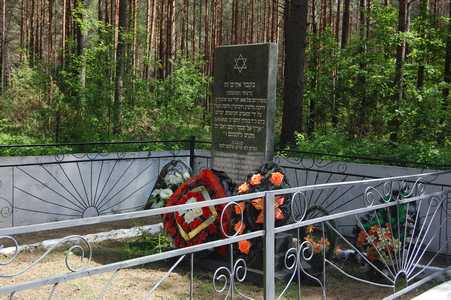 The monument to the Jews -
The monument to the Jews -victims of the Nazi genocide. By 25 June a great number of people had gathered in Volma. They were banging about and asking. They decided to delegate my sister Musya to the head of the military unit. She was then 22, energetic, and worked as a school head teacher. The head of the military unit was a Jew. She came to him and said: – Cows have been slaughtered, pigs have been slaughtered, nothing is left. Let the people leave. He refused at first. Then he turned and walked away. My sister realized that he couldn’t let people go, but at the same time he felt pity for them, probably, guessing what would happen to them. Musya returned to the people and said, “Let’s go. They won’t do anything to us.” When we were crossing the old border, we heard just one shot after. And we kept on going ... Right up to Bryansk where we came on foot ... On our way we met different people. There were those who helped us, and there were those who closed wells, and gave us no water. – Who remained in Volma? 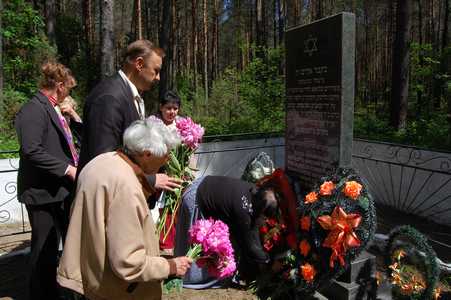 Flowers at the monument.
Flowers at the monument.
– My father led 24 people out. He wanted the whole community to leave Volma, but some people said they were old and couldn’t walk, others didn’t wish to leave their property. My grandmother and the housekeeper remained in the house. When the Germans occupied Volma, they kicked out the housekeeper, and my grandmother was shot. Our house was burned down. My uncle Pinya Zalmanovich Kantorovich lived in Ivenets. Before the war he graduated from the University of Warsaw. He was a good doctor, a very competent person. 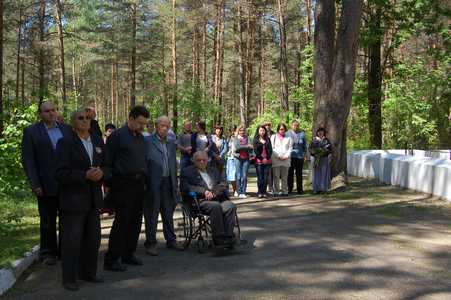 A moment of silence.
A moment of silence.
A German plane was shot down over Ivenets. The pilot bailed out in his parachute. He was wounded and taken to hospital. He wasn’t recovering. The Germans said that the doctors gave poor treatment to the pilot. There were three doctors in Ivenets, all Jews. The Germans shot them as well as my uncle. The Germans ordered all the Jews to gather. They took every tenth and shot. During the war I was in Magnitogorsk, worked at the metallurgical plant. In 1944, after the liberation of Belarus, my father was summoned to Ivenets to restore the national economy. At first, he worked in the administrative division, later was the Chairman of the village consumers society. Brother Moisei, having been seriously wounded, returned to Ivenets from the front. My sister came here. The family began to gather together, but I was not allowed to leave Magnitogorsk. I went to the director, and he said: “Nobody has the right to let you go away from such a plant”. In the early postwar years about 70 Jews lived in Ivenets. They returned from the front, partisan units, evacuation. It was only in 1954 that I came back to Ivenets. I gave the money I earned in Magnitogorsk to my father, we bought a small house. So I lived. I managed the warehouse in the consumers society… Today, you can count on fingers those who remember not just the pre-war but the first post-war period in Ivenets. |
|||
|
|
Jewish settlements in Minsk regionMinsk • Berezino • Bobr • Borisov • Dolginovo • Dukora • Dzerzhinsk • Ivenets • Myadel • Nesvizh • Obchuga • Pogost • Rakov • Seliba • Slutsk • Svir • Uhvaly • Vileika • |
Main |
New publications |
Contacts |
Site map |
Vitebsk region |
Mogilev region |
Minsk region |